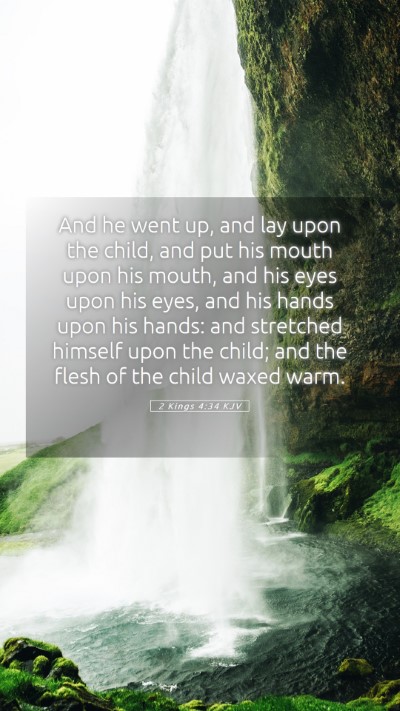Bible Verse Explanation: 2 Kings 4:34
Verse Reference: 2 Kings 4:34
Verse Content: "And he went up, and lay upon the child, and put his mouth upon his mouth, and his eyes upon his eyes, and his hands upon his hands: and he stretched himself upon the child; and the flesh of the child waxed warm."
Understanding the Meaning of 2 Kings 4:34
This verse is part of the account of the prophet Elisha's miraculous work in raising the Shunammite woman's son from the dead. It shows Elisha’s intimate and sacrificial approach as he emulates the child's state in an act of intense compassion and faith. Here, we explore the significance of this act and its implications for further biblical interpretation.
Summary of Insights and Commentary
- Matthew Henry's Commentary: Henry emphasizes Elisha's faith and fervency in prayer. The act of stretching himself over the child signifies his earnest compassion and desire for the child’s restoration. The warm flesh indicates the return of life, which Henry likens to Christ's miracles, demonstrating the power of God through human vessels.
- Albert Barnes’ Notes: Barnes highlights the symbolic act of laying upon the child. It represents a transfer of life and spirit, akin to the intimate relationship between a mentor and disciple. This action also mirrors Christ's healing ministry, suggesting the continuity of divine power through the prophets of the Old Testament.
- Adam Clarke's Commentary: Clarke reflects on the nature of this miracle as a testament to God's sovereignty over life and death. He notes the detailed description of Elisha's actions indicates the seriousness of the circumstances and the deep concern Elisha had for the mother. The ‘warming’ of the flesh serves as a crucial sign of the onset of life after death.
In-Depth Analysis and Further Applications
Understanding 2 Kings 4:34 requires consideration of several elements:
- Divine Intervention: The verse illustrates God’s willingness to intervene in human crisis, paralleling the New Testament miracles of Jesus, thus reinforcing the idea of life’s sanctity and God’s power over death.
- Symbolism of Life Transfer: Elisha's actions resonate with themes found throughout Scripture where prophets represent God’s authority. The act of laying on symbolizes an impartation of spiritual life, resembling the principles of how believers are called to intercede for one another.
- Connection to Faith and Prayer: This episode invites believers to meditate on the relationship between faith and miraculous outcomes. Elisha's example teaches us about fervent prayer and heartfelt action in response to the needs of others.
Cross References Related to 2 Kings 4:34
- 1 Kings 17:17-24: Elijah raises the widow’s son, highlighting similar themes of life restoration.
- Mark 5:41-42: Jesus raises Jairus’ daughter, indicative of the continuity of resurrection power.
- John 11:43-44: Jesus raises Lazarus, reinforcing the belief in Christ's control over life and death.
Conclusion
In conclusion, 2 Kings 4:34 serves as a profound lesson on the power of prophetic intercession, the significance of faith, and the biblical understanding of life. It is a poignant reminder that through earnest prayer and compassionate action, believers can participate in God's work of restoration and life-giving power. For those engaged in Bible study groups, online Bible study, or independent Bible study lessons, exploring such passages can deepen one’s Bible verse understanding and enhance biblical exegesis.
Related Keywords for Further Study
- Bible verse meanings
- Bible verse interpretations
- Bible verse commentary
- Scripture analysis
- Understanding Scripture
Engaging with 2 Kings 4:34 equips believers with insights applicable to daily life and encourages deeper reflection on the ways God works through ordinary people to achieve extraordinary outcomes.


